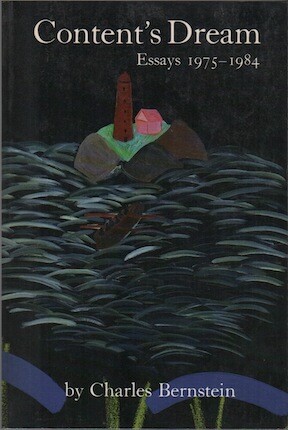
'Content's Dream': Essays 1975–1984 — digital edition

First digital edition (pdf) of Content’s Dream: Essays 1975–1984. PDF ($8) available here.
From the publisher:
First published in 1986 by Sun & Moon Press, and now a classic for all who care about the poetry and poetics of the late twentieth-century, Content’s Dream is a witty, consummately intelligent, and ever-stylish collection of essays by one of the country’s most innovative and influential poets, whose work has come to be associated with L=A=N=G=U=A=G=E, the magazine he coedited at the time these essays were being written.
Addressing a wide range of arts and ideas, Bernstein moves rapidly from philosophical reflections on Ludwig Wittgenstein and Stanley Cavell, to the film antics of Mad Max and the cinema of Stan Brakhage; from the paintings of Arakawa to the poetics of William Carlos Williams and Robert Creeley; from the modernist poetry of Gertrude Stein, Laura Riding, and Louis Zukofsky to the contemporary poetry of Jackson Mac Low, Lyn Hejinian, and Ron Silliman. Bernstein’s essays are poetic enactments rather than abstract theories, embodying in the way they are written the aesthetic values they passionately and eloquently express.
While providing an essential introduction to the innovative poetry and poetics of L=A=N=G=U=A=G=E, Bernstein’s investigations center on the relation of art to politics and specifically the politics of poetic form. He also explores the conditions, experiences, and alienation of everyday life and the ethical traps of characterization and representation. Bernstein imagines a “thinking” poetry of both process and critique that acknowledges — and responds to — the intractability and complexity of contemporary cultural and social problems.
As Ezra Pound’s Gaudier-Bzeska, William Carlos Williams’s Collected Essays, and Gertrude Stein’s How to Write served for their time, Bernstein’s provocative essays are documents central to the poetic theory of their day.
At once irreverent and politically engaged, complex and comic, as indebted to Groucho Marx as it is to Karl, Content’s Dream is essay-writing at its most exuberant and profound.
••••
“Certain works are recognized as defining an epoch. … Postmodernism is now a distinctly articulated cultural formation. Within it, Content’s Dream has been without question one of its defining critical and aesthetic documents.” — JEROME MCGANN, University of Virginia
“A terrific manifestation of an exemplary contemporary intellectual forging what we might consider a conscience for his time.” — CHARLES ALTIERI, University of California, Berkeley
“[Content’s Dream] is the most exciting and challenging book of essays I have read in quite some time. The range of reference, style, and thought makes for stimulating reading, the kind that inevitably leads to other reading (as well as re-reading).” — HANK LAZER, Missouri Review
Contents
One/The Secret of Syntax
Three or Four Things I Know about Him
Semblance
Stray Straws and Straw Men
A Particular Thing
Style
The Dollar Value of Poetry
Thought’s Measure
Two/Film of Perception
Frames and Reference
Words and Pictures
Three/Reading, Person, Philosophy
The Objects of Meaning:Reading Cavell Reading Wittgenstein
Meaning the Meaning:Arakawa’s Critique of Space
The Stadium of Explanation
On Theatricality
G--/
Writing and Method
Two/Conspiracies
Introduction
The Academy in Peril:William Carlos Williams Meets the MLA
Jackson at Home
Maintaining Space:Clark Coolidge’s Early Works
Making Words Visible/Hannah Weiner
The Alphabet of Stride
Counting and Uncounting
Writing against the Body
Robin Blaser Introduction
Hejinian’s Notes
I Think I Understand Alan Davies
With Words:An Assembling of Visual Works from New York
Hearing ‘Here’:Robert Creeley’s Poetics of Duration
Narrating Narration:The Shapes of Ron Silliman’s Work
Undone Business
The Telling
The Conspiracy of “Us”
Three/Flesh
Blood on the Cutting Room Floor
Living Tissue/Dead Ideas
Four/Catechesis
An Interview with Tom Beckett
Socialist Realism or Real Socialism?
Characterization